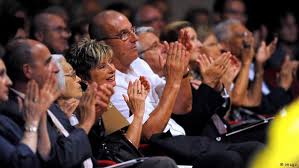Yesterday I had an enjoyable phone talk with a freshman at Stuyvesant High School in New York, which happens to be where I went, decades ago. He’s doing a project about why classical music isn’t popular today, and, as many people do, found me online and hoped I’d talk to him, which I was happy to do.
I enjoyed every minute of our talk, and one part of it — how he came to classical music, and his reaction to his first orchestra concert — is worth reporting here.
So how did he come to classical music? From hiphop. That would seem to be his musical home base, or one of them. He was reading about a hiphop song he likes, and learned that some of what went into the music had been sampled from Satie. He then listened to Satie, and from there branched out. With great interest. but also feeling he didn’t know much, and — as he said — feeling that the classical music world doesn’t do much to make someone like him feel welcome.
 And the orchestra concert…since he lives in New York, no surprise that it was the NY Philharmonic. And one big reaction he had was surprise that almost everyone there was white. Not something he’d see in his normal life! I’m a native New Yorker, and still go to NY regularly to teach, and so I completely get it. Plus I live in a majority black city, Washington DC. The streets here and in NY can be a smorgasbord of people. As is the school my son goes to. It’s a surprise to find myself (as I more often did in previous years) in a place where most people are white.
And the orchestra concert…since he lives in New York, no surprise that it was the NY Philharmonic. And one big reaction he had was surprise that almost everyone there was white. Not something he’d see in his normal life! I’m a native New Yorker, and still go to NY regularly to teach, and so I completely get it. Plus I live in a majority black city, Washington DC. The streets here and in NY can be a smorgasbord of people. As is the school my son goes to. It’s a surprise to find myself (as I more often did in previous years) in a place where most people are white.
This student’s surprise at the Philharmonic supports something in a Guardian article I blogged about. In which the CEO of the English National Opera, having come to his job from a career in TV, found the ENO pretty much all white, and said that felt strange to him. And added that young audiences also think it’s weird. Here’s a young audience member who might demonstrate the truth of that.
So there are two lessons for us here. First is one that ought to be obvious. If we want younger people, we’ll find them in their own world, in this case listening to hiphop, which of course many, many people do. If we’re not comfortable in that world — if we can’t be at home there — how will we talk to the younger people we want to attract?
And the second lesson is what one younger person just supported — that a mostly white audience can feel uncomfortably weird.

Hi Greg! Long time no angry email or FB message! I’m a composer for film and games ( still aspiring, loll ) At least orchestral music has been saved by media music. Regarding “Classical” music, the other thing that pushes people away, aside from the white wash (probably because of a lot of racism too), is that fucking bourgeoisie culture and pretentious undeserved sense of superiority and entitlement.. I listen to a lot of KUSC (radio) in the Los Angeles area. They have this guy on there named Jim Svejda who gives awesome back stories and info about the composers etc.. but goes in and out of a British accent. Drives me crazy! I wish people in the classical world would just talk, act, and dress normal, especially at events and performances, so that regular middle-class people can relate and not feel intimidated and turned off. As a composer, I’ve seen this go on for so long, especially in the education system where the worst of them seem to live. Don’t even get me started with the composition teachers who still push atonal music onto their students, who in turn, inherit their teacher’s bitterness for a marketplace that rejected that music 100 years ago..
Good to see you here!
I think everything is changing. Even the composition teachers. The whiteness is slow to change, though as I’ve argued on Facebook (soon to be put here), it could change a lot faster. But I do have some hope, despite the truth of what you’ve said.